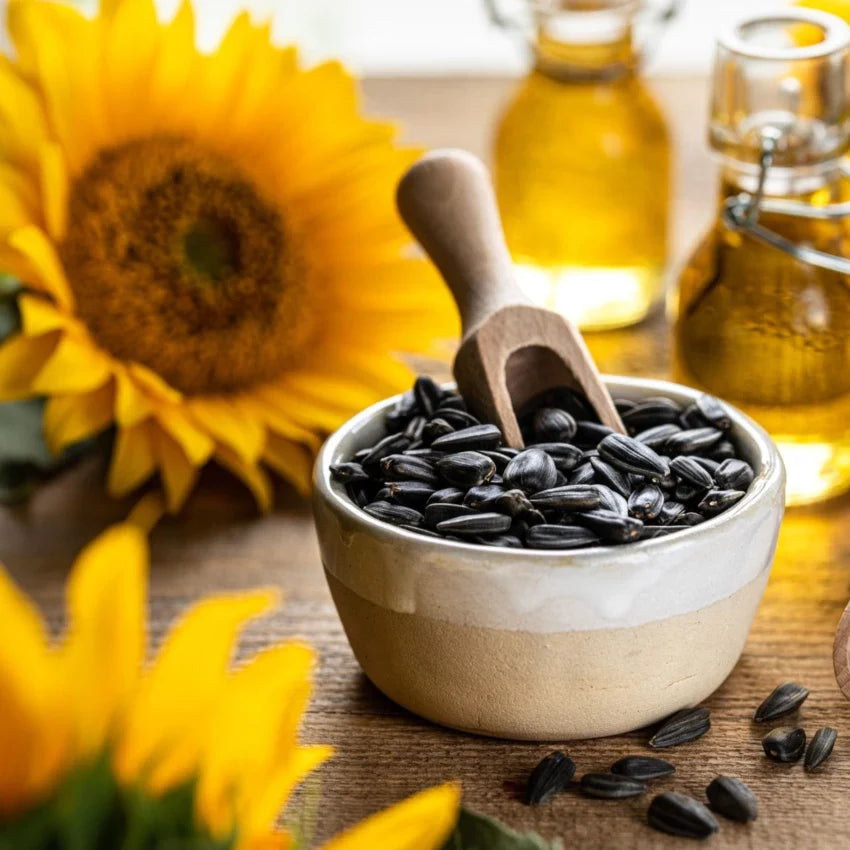
The Ultimate Guide to Sunflower Seeds: Benefits, Uses, and Nutrition
Share
Sunflower seeds are more than just a crunchy snack; they are a powerhouse of nutrients packed with essential vitamins, minerals, and healthy fats. Whether you enjoy them raw, roasted, or as an ingredient in various recipes, sunflower seeds offer numerous health benefits. In this blog, we’ll explore why sunflower seeds deserve a place in your daily diet.
Nutritional Value of Sunflower Seeds
Sunflower seeds are nutrient-dense and provide a significant amount of essential vitamins and minerals per serving. Here’s what makes them special:
-
Rich in Healthy Fats: Sunflower seeds contain heart-healthy unsaturated fats that support overall cardiovascular health.
-
Packed with Protein: A great plant-based protein source, perfect for vegetarians and vegans.
-
High in Fiber: Helps with digestion and keeps you feeling full longer.
-
Loaded with Antioxidants: Contains vitamin E, which protects cells from oxidative damage.
-
Essential Minerals: Includes magnesium, selenium, and zinc, which support immune function and overall well-being.
Health Benefits of Sunflower Seeds
1. Supports Heart Health
The healthy fats and magnesium in sunflower seeds help reduce bad cholesterol levels and maintain a healthy heart.
2. Boosts Immunity
With a high content of selenium and zinc, sunflower seeds strengthen the immune system, helping your body fight off infections.
3. Enhances Skin and Hair Health
Vitamin E in sunflower seeds promotes healthy skin by reducing signs of aging and keeping your hair strong and shiny.
4. Aids in Weight Management
The fiber and protein in sunflower seeds help control hunger and prevent overeating, making them a great addition to a weight loss diet.
5. Reduces Inflammation
Sunflower seeds contain anti-inflammatory compounds that may help alleviate symptoms of chronic diseases like arthritis.
How to Incorporate Sunflower Seeds into Your Diet
Sunflower seeds can be enjoyed in many delicious ways. Here are some simple ideas:
-
As a Snack: Eat them raw or roasted for a crunchy, nutritious treat.
-
In Salads: Sprinkle them over salads for an extra crunch and added nutrition.
-
In Smoothies: Blend sunflower seeds into your favorite smoothie for a protein boost.
-
In Baking: Use them in bread, muffins, and granola bars for extra texture and flavor.
-
As a Butter: Sunflower seed butter is a tasty alternative to peanut or almond butter.
Potential Side Effects
While sunflower seeds are healthy, consuming them in excess can lead to potential drawbacks:
-
High in Calories: Overeating may contribute to weight gain.
-
Sodium Concerns: If choosing salted sunflower seeds, watch your sodium intake.
-
Allergic Reactions: Some individuals may be allergic to sunflower seeds, so proceed with caution if trying them for the first time.
Conclusion
Sunflower seeds are a delicious, nutritious, and versatile food that can benefit your health in multiple ways. Whether you enjoy them as a snack or incorporate them into your meals, they provide essential nutrients that support heart health, immunity, and overall well-being. Add sunflower seeds to your diet today and reap their incredible health benefits